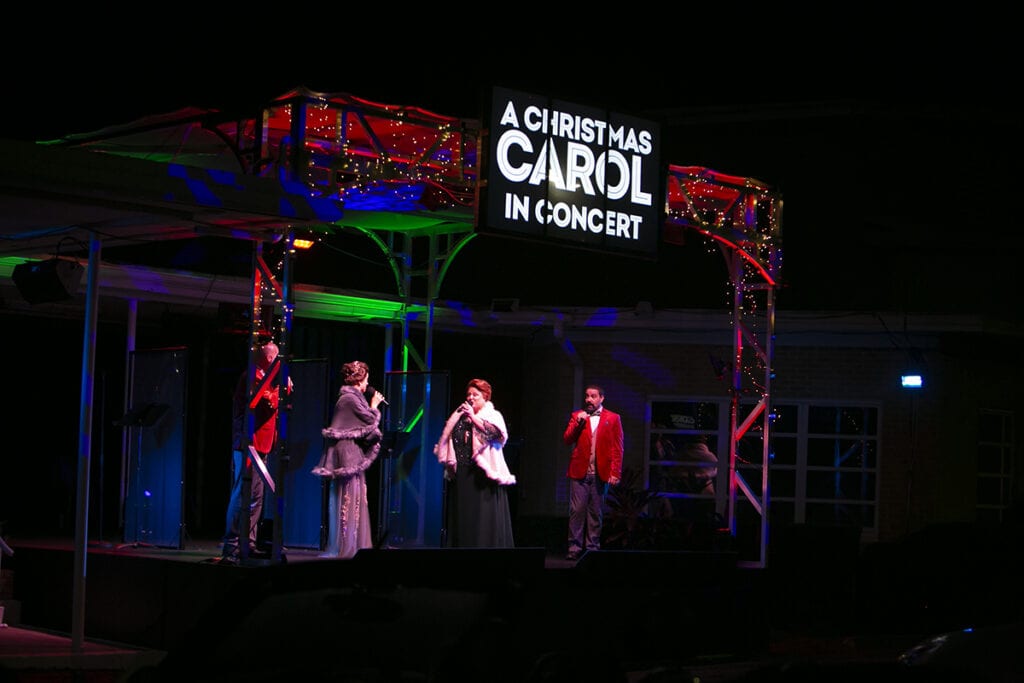February 26, 2021 | By Talia Fish
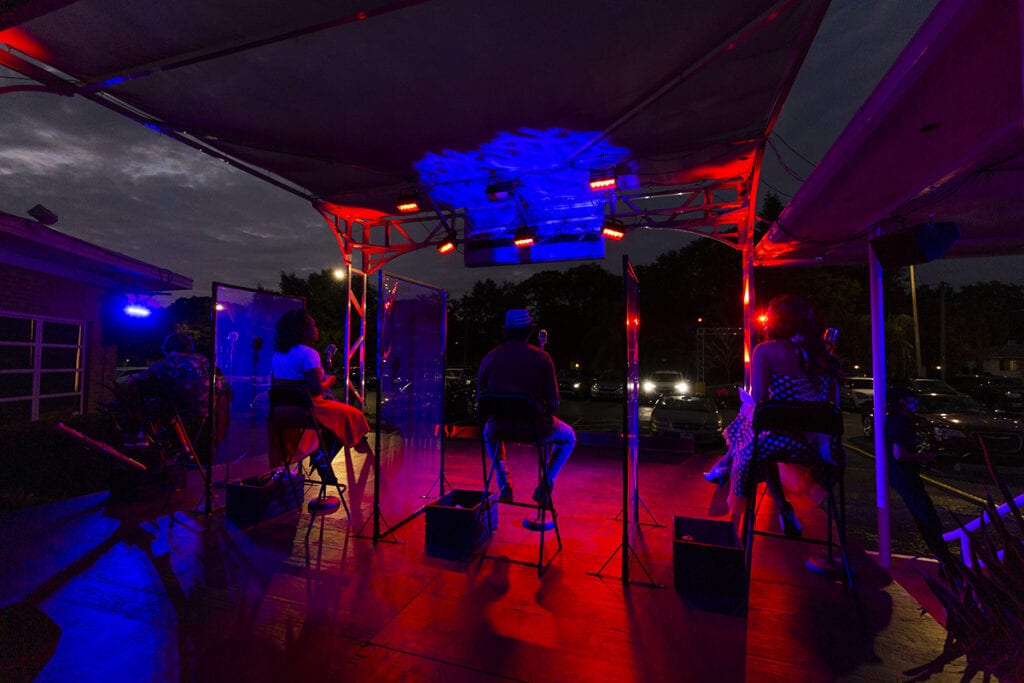
. . .
Theatre in Tampa Bay, and across the country, still holds its breath as case numbers continue to rise and fall. We hope for the best, but there are still endless unanswered questions: Will we ever ‘get back to normal’? Do we want to? Will we have to redefine what a ‘full house’ means? What will our season look like?
Luckily, the theatre has always been – and forever will be – a room filled with the most creative minds the world has to offer. When stage sets, scrims and backdrops become green screens and virtually designed backgrounds, you can’t help but joyfully revel in the creativity that blooms in the face of adversity.
Sure, we still have questions that don’t have answers yet, but for now, we can dive head-first into ingenuity and reimagining what theatre can be. With a virtual world at your fingertips, it is easy to forget the real one is in such disarray.
. . .
. . .
Theatre is something you can escape into or be called to action by, depending on what you need on a certain day. For theatre practitioners, there was comfort in the assuredness of a process. Looking back to what theatre previously entailed, we see a familiar recipe unfold before us. You plan a season, you find a team – you plan, you execute, you repeat.
For those of us who usually see the theatre from an audience’s perspective, I’ll take you on a backstage tour of what goes on behind the scenes and what really goes into the making of theatre at American Stage and freeFall Theatre.
The prep work for a play or musical doesn’t start with an audition and casting the actors, it begins months in advance with the formation of the creative team. Once designers, producers and a director are decided on, the production meetings start. Collaborative and chaotic in their own right, production meetings ‘set the stage’ for what goes on the stage.
. . .
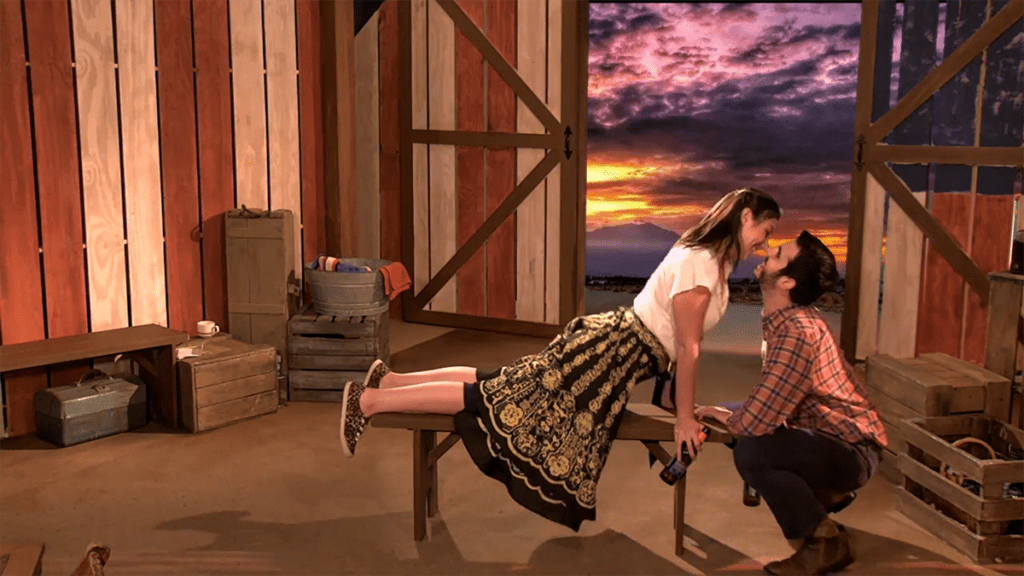
. . .
With ample time allotted, the director works with set, lighting, costume, sound and prop designers to analyze what the play calls for. What light do we need to create the best atmosphere and look for this fight scene? Will it clash with the paint the set designer wants for the living room walls? What costumes best show where the characters are in life – their status, their style, or their society? Better yet, what music do we use to tie it all together? You can imagine the difficulty of coming to a conclusion with little to no egos wounded in the process.
This process, however, is one theatre practitioners have known for decades. In a way, we may have slipped into a monotony. Without a doubt we held firm to our creative intuition and our brilliant concepts, but did we fall into a blind acceptance for the way things were? We needed a reevaluation – something to shake things up.
And shake things up we did last year. American Stage took ‘the new normal’ in stride and got to work on how to bring theatre back after COVID closed theatre doors in March of 2020. Rachel Harrison, the Production Stage Manager at American Stage, helps shed a light on what’s happening on the other side of the screen – and what happens before virtual live performances begin for you.
. . .

. . .
When asked what has changed and how they’ve adjusted, she shares that, “Since March of 2020, production teams have been reduced significantly, and the company has relied heavily on only a handful of people to handle the visual and practical elements of each performance.”
Props and costumes that were once handled by full teams are now left to actors, as they scour their houses for the perfect prop mug, or the blouse to transform them into a character. There is a certain thrill to the excitement that comes with knowing you have just the right thing for the job, and actors now have a hand in that creative process.
Rachel says that, “they even set up their own lighting with vanity or selfie ring lights.” Obviously, this prep work takes some time, too.
Sometimes, American Stage will ship equipment, props and costumes to an actor’s home to help prepare for an online performance. If something doesn’t work out, though, there must be some wiggle room for replacements and readjustments.
Interestingly, for sets, American Stage has shifted to the creation of virtual backgrounds. It looks like the innovation of virtual backgrounds, which frustrated many of us during our Zoom meetings, are taking the virtual theatre world by storm. We’re seeing new needs in the “sound effect and music integration” areas as well.

Live online theatre is challenging to even the most seasoned actor, but it is even harder to execute. You can only imagine how Rachel’s job as a stage manager has shifted over the last year, thrust into Zoom meetings and rehearsals. Just like any stage manager though, she took those adjustments perfectly and eased into the transition.
You have to think, too, that from March through the summer, many theatres took a breather to explore their options on virtual presentations. “American Stage paused too, briefly, to explore digital options, and to plan next steps,” Rachel shares. American Stage, renowned for their professionalism and heart, welcomed these distanced rehearsals by, “including a quick review/coaching session on how to use Zoom, what settings to adjust, and what to expect in each new cast’s first rehearsal.”
A big hump in the learning curve for many performers was in understanding how interactions worked and changed within the confines of a digital world. Actors are well accustomed to ‘picking up cues’ and overlapping lines onstage – but on platforms like Zoom where lag is an inevitability, they are faced with the inability to interrupt or overlap like they have been used to.
. . .

. . .
“Once upon a time, before the world was COVID, the cast would be given a half-hour call time prior to the show start,” Rachel tells me. For those of you who aren’t familiar, “If you’re early, you’re on time – and if you’re on time, you’re late,” is a humorous but valid mantra in the theatre. Not only is it time for professionals to prepare for their job, but the actors need that time to warm up, put their makeup and costumes on, and prepare in their own way for the journey they are about to take the audience on.
Rachel would normally run this ship, calling warnings as the curtain time of 7:30 drew closer. The change we see at showtime now lies in what we see on screen. When the lights ‘come up’ on your computer screen, you can’t have actors running around if the audience is watching!
So, actors now have to come “to the theatre” a little earlier to prepare. The stage manager needs to be ready when the digital space opens, too. If the stage manager is operating the streaming platform and cues, they have to be ready for those technical demands with systems tested and ready to go when the audience logs in.
Lots of things changed, but many stayed the same – there is still some comfort in familiarity. Audiences are allowed onto American Stage’s streaming platform no earlier than 15 minutes before showtime – and just like a real playhouse, there are a limited number of ‘seats’.
While the shift to a digital and more technologically heavy environment is hardest for a director and their actors, Rachel feels like this shift has simplified things for her in some ways. After all, “There is only so much one can do from a chair in front of a screen in a home office.”
Rachel still had to do a lot of learning to prepare for a cohesive, comparable and complete experience for both audiences and creative talent. “I had to learn more than I ever thought I’d want to know about streaming platforms, digital meeting spaces and how to integrate open-source programs, such as OBS, with programs like QLab,” Rachel explains with grace, proving that a stage manager’s job is no walk in the park.
. . .
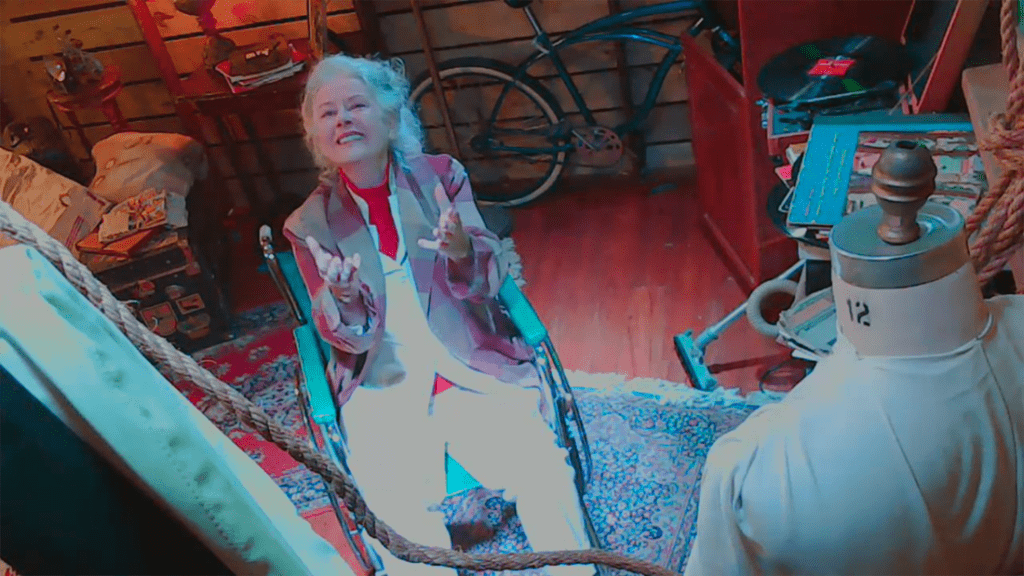
. . .
Even so, she greets it with open arms and a sense of humor. OBS, or Open Broadcaster Software, is an online software for live streaming and video recording that helps create the screen you see when you log in to a performance. When paired with a program like QLab, software used to cue video and sound in live performances and virtual ones, it makes running a regular live performance look effortless. The flawless presentation you watch from home is the product of a lot of time, research, and trial and error.
Rachel spent many studious hours researching programs, exploring free trials and practicing the new online programs that industry professionals and other stage managers were using. The most important aspect of her research and learning, however, was the knowledge that was shared with her.
We all had the standard COVID-19 safety precaution information, whether it was a 5-second ad on Hulu or through your workplace, but Rachel took her studying a step further. “I spent much of the summer and autumn of 2020 learning and sharing knowledge in areas ranging from self-care and mental health first aid, to COVID compliance in the workplace,” she shares.
The funny thing about this shift to the digital world is that it allowed many of us to reflect on some of the things that kept us up at night, or that stressed us beyond belief. It allowed us to take a step back, take a deep breath and take some well-deserved time for ourselves. And that is okay.
For stage managers like Rachel, many nights stretch into early mornings – sending reports, emails and line notes to the production team. Doing some mental reconnaissance and practicing self-care is an important skill to have when you work in a high-stress job – even if you love what you do.
The theatre is a wonderful place to be, whether you’re in the audience, on the stage, in the tech booth, or backstage. Sometimes, though, even the most wonderful places can be taxing on your mind and mental health.
Many theatre practitioners are used to long days, long nights and demanding rehearsal schedules. Oftentimes, we forget to eat, or just barely find the time to sleep before having to get up and do it all again the next day.
. . .

. . .
For actors, a great deal of the work done for performance is stepping into your role. This comes with a plethora of experiences and emotions. Think to the last performance you saw where an actor blew up in someone’s face, wailed in despair or laughed ‘til their face turned red. Now think how much preparation, planning and effort that takes to replicate for eight performances a week.
Mental health in theatre is a dodgy subject, much like in our everyday lives. Some say it’s taboo, or that you leave that kind of thing at home – but it follows you around no matter how hard you try.
We take care of any other organ with apt and prompt care, but why don’t we give a little TLC to our most hard-working organ, the brain? With the shutdown that ensued last March, it was a heavy weight of uncertainty for so many in the theatre. But with that shutdown also came a time to look back and recognize what needs changing. What is entirely necessary to run this ship, and do we need to half-drown in order to keep sailing?
Like Rachel’s research and exploration in fields completely new to her, I think we all can take a little time to learn how to take better care of each other and ourselves.
American Stage’s current show, Satchmo at the Waldorf by Terry Teachout, combines actor L. Peter Callender in a performance space in St. Petersburg with the tech team and stage manager in separate rooms, and the director on Zoom to guide the process. Satchmo at the Waldorf plays through March 7.
It’s “a one-man, three-character play in which the same actor portrays Louis Armstrong, Joe Glaser and Miles Davis. In a dressing room backstage at the Empire Room of New York’s Waldorf-Astoria Hotel, Armstrong seeks to come to terms with his long-standing relationship with Glaser, whom he once loved like a father but now believes to have betrayed him.”
. . .
. . .
You may also want to keep an eye out for American Stage’s announcement regarding their 2021 Summer Camp on March 1. They will also be making a statement on the COVID Theatre Closure Anniversary and the update of their 2020-2021 season on March 12.
From one theatre to another, both changes and differences in approach to this new world of theatre are to be expected. FreeFall Theatre Company is open for business with “safe, outdoor, drive-in performances.”
. . .
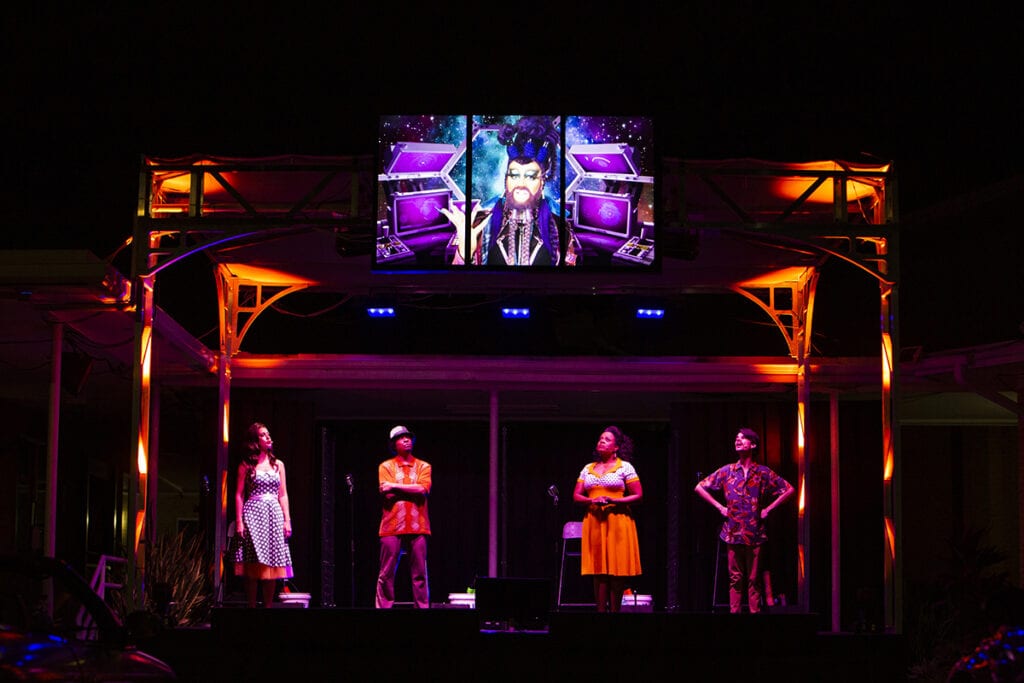
. . .
These live, drive-in performances let audiences experience live shows again from the comfort and safety of their own vehicles. FreeFall audiences are “thrilled to have something fun to do where they can leave the house,” says Matthew McGee, the Outreach and Marketing Director for freeFall. (The Tampa Bay Times shares a detailed description of their first project, an adaptation of Orson Welles’ classic War of the Worlds broadcast, as a lively variety show this past fall.)
Matthew just finished his run of Scott and Patti, Get A Real Job! at freeFall on February 21 after the show was extended due to a wonderful run.
While Scott and Patti have managed to get some shows out to the public through Instagram and Facebook Live, the show is more accustomed to performance spaces like Catherine A. Hickman Theater of Gulfport, Highlands Playhouse, St. Petersburg Yacht Club and even American Stage (Scott and Patti: Home for the Holidays). The Scott and Patti act returned to the freeFall stage this year with Scott and Patti: Get A Real Job!, presented as part of the theatre’s drive-in concert series.
. . .
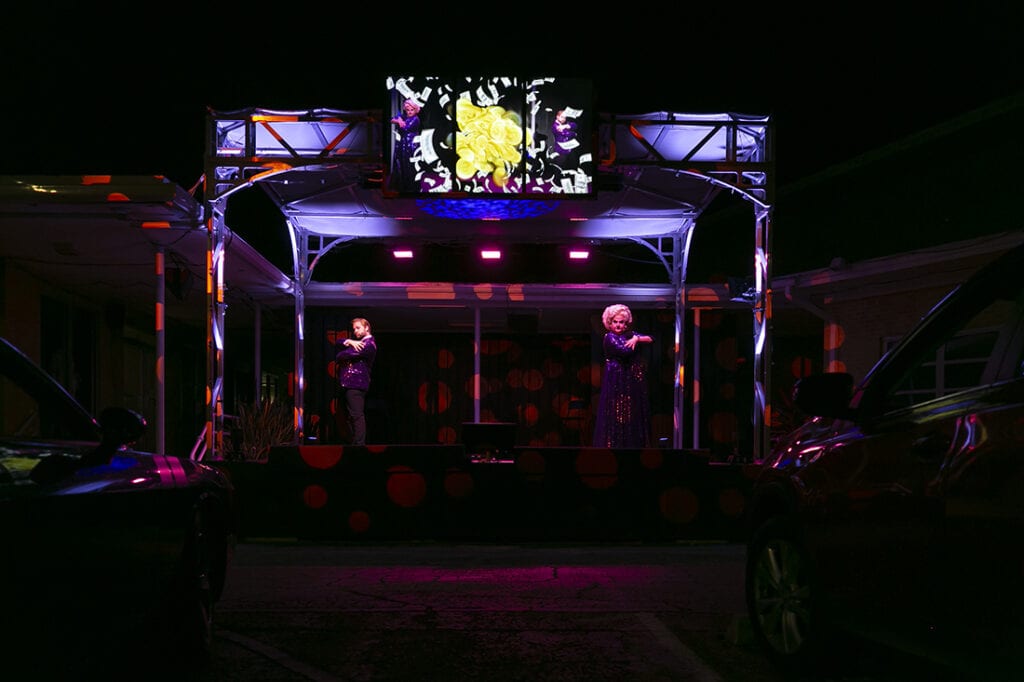
. . .
Scott and Patti originally premiered at freeFall in 2013, so their return to the theatre makes perfect sense. This all-new comedy cabaret had over 250 video cues, a live band and special guest stars appearing on the adapted outdoor stage. Audiences experienced the musical comedy act from the safety of their vehicles without having to “worry about the rising infection numbers.”
Staging the performance this way does come with some setbacks, however. “The Scott and Patti show is very much dependent on audience response and audience interaction,” shares Matthew, “It was very different with them honking their horns and with us unable to hear their laughter.”
To help combat this spatial divide, McGee and his production team worked to combine the live musical performance with audio storytelling and multimedia elements. Matthew even filmed a “mukbang” video as Patti, to put in the show.
. . .
team effort of creating freeFall’s first drive-in show, a music-rich version of War of the Worlds
. . .
FreeFall has experienced its share of growing pains as they adjusted to outdoor performance. In order to stay clean, safe and ensure the best enjoyment, all patrons are required to remain in their vehicles for the duration of the performance. In the set up of their parking lot as a new audience space, freeFall mirrored their indoor space and set up the best way they could. They added numbers to parking spaces and provided sanitation stations throughout the property.
“We had this amazing extra space and we decided to use it,” Matthew confesses. The backstage process for performers includes transforming the green room space into a tech room, their black box space into a band room, and various other spots in the building reserved for actors to maintain social distancing as they get ready for their performance.
Following the fairly standard COVID protocol, freeFall has production teams tested regularly during the run of a show and holds temperature checks before starting work each day. Many actors who take part in this drive-in performance space “are simply thrilled to be working and appreciate all freeFall has done backstage to keep them safe,” says Matthew.
. . .
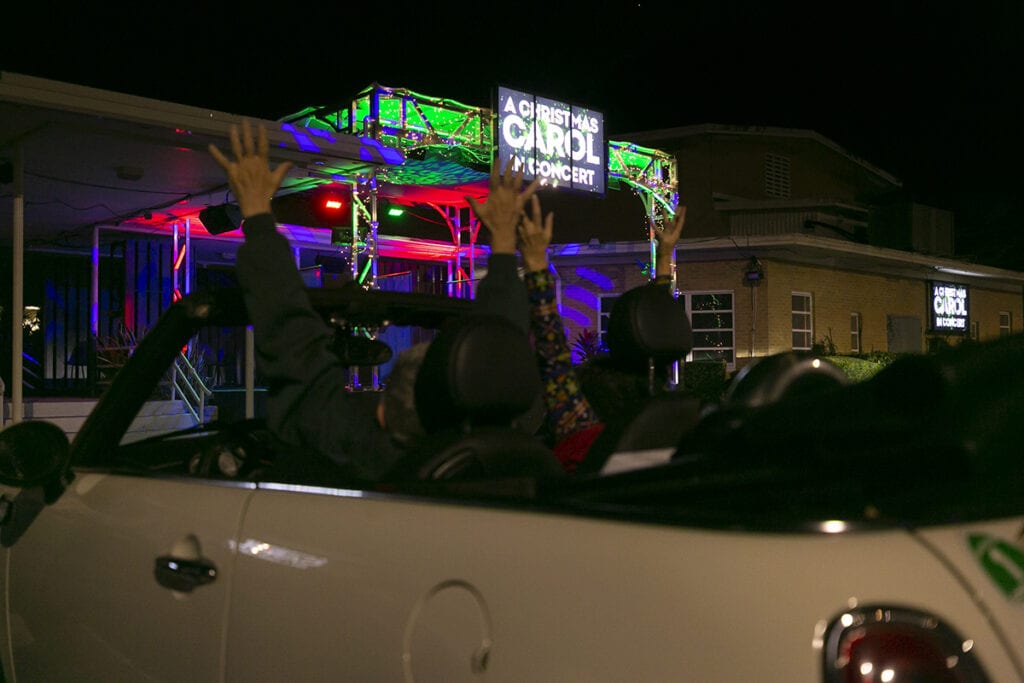
. . .
An important variable to freeFall’s drive-in theatre is the use of radio sound design and presentation. For Scott and Patti: Get A Real Job!, the audio was broadcast right to audience vehicles via each car’s FM radio. “The sound is the star of the show for these drive-in productions,” and the sound designer and production team have worked hard to make sound control easy and clean for audience members.
With freeFall doing live performances on an outdoor stage, they’ve had to learn many things throughout this pandemic. From building an outdoor stage with barriers to separate actors to learning how to maneuver low-power FM broadcasting to broadcast the sound to car radios and, freeFall has taken it all in stride.
With this exciting new outdoor experience, “it’s been nice to be able to safely spend time with other artists and create something new,” Matt shares, on working on Scott and Patti with his co-creator Scott Daniel. Matt is used to wearing many hats at freeFall, so the shift to creator and performer was nothing but smooth sailing.
As freeFall prepares to announce their future plans for the drive-in space and the eventual return indoors, all we can do is sit tight and patiently wait – even if that sitting is at the edge of our seat.
. . .
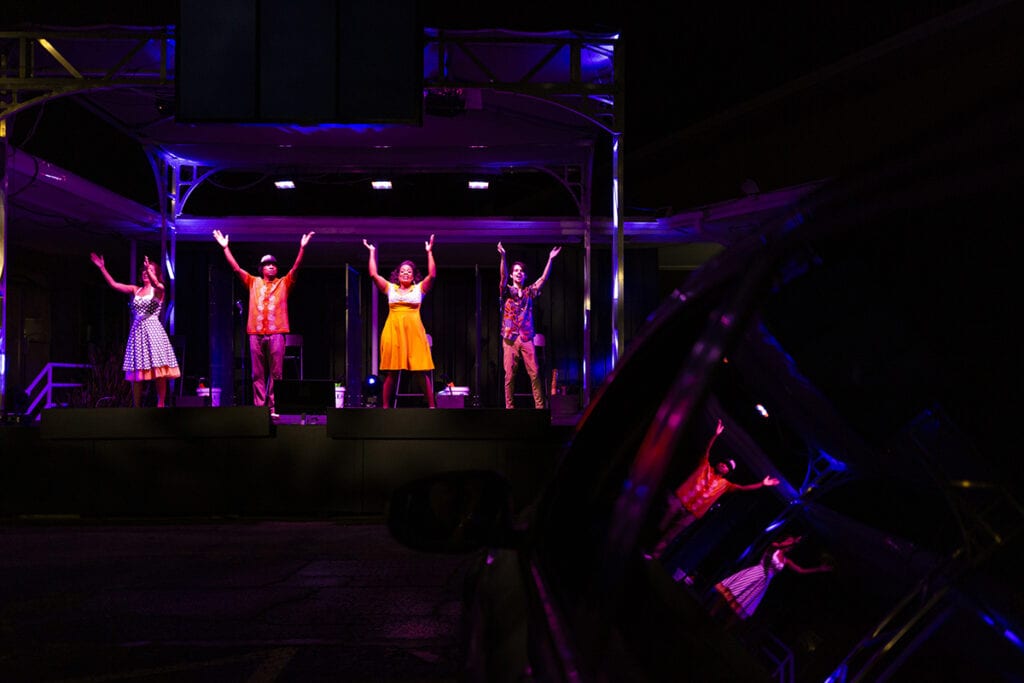
. . .
Actors and directors alike couldn’t deny that the shift to online theatre was, in some strange way, happily welcomed. Sure, challenges arise as actors serve as their own wardrobe and stage crew, lighting designers and IT support, but as Rachel says, “They are rock stars of change. They are making their way through this new, confounding, frustrating and ultimately rewarding space – just like the rest of us.”
American Stage and freeFall recognize that everyone is eagerly anticipating and awaiting the return to in-person performances, and to a possible semblance of pre-COVID normalcy. They are taking their time to learn and grow, even if we may never return fully to what ‘normal’ was.
And as Rachel says, “the changes that have been explored and absorbed, and the challenges that have been met, will forever shift Theater in ways we can only hope will expand opportunities and horizons for all theater workers and audiences.”
Though the world feels uncertain right now, we at least know that theatres like American Stage and freeFall will forever be committed to keeping audiences alert, fulfilled and entertained.
. . .
americanstage.org.. . . . . . . .freefalltheatre.com
. . .
Rachel Harrison recommends mentalhealthfirstaid.org for more on Mental Health First Aid
The American Red Cross offers online training in Mental Health First Aid
Find resources on self-care during the pandemic here
If you need to talk to someone, you can find help here
. . .
